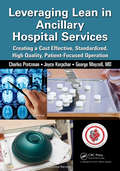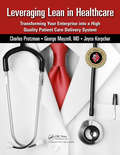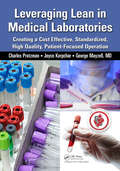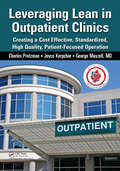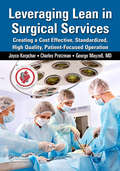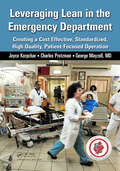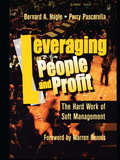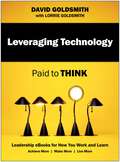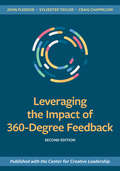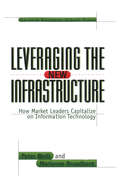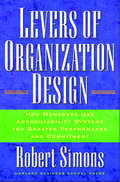- Table View
- List View
Leveraging Financial Markets for Development: How KfW Revolutionized Development Finance (Executive Politics and Governance)
by Peter VolberdingThis book investigates how development institutions created and promoted marketized development financial instruments to increase the speed and scope of assistance by leveraging private financial markets for development objectives. To attract private investors, donor governments agreed to bear the risk in these new instruments in order to mobilize investment during times of political crisis. In particular, this book contends that Germany’s KfW played an outsized role in the development of these new financial instruments, particularly in microfinance banks and structured funds, as KfW’s unique institutional attributes and strong political support from the German government at critical junctures fostered financial innovation. Using over 70 interviews and a cache of newly released archival materials, this books documents how KfW and other development institutions created and promoted these marketized development financial instruments, and how they have become a pillar of modern development policy.
Leveraging Lean in Ancillary Hospital Services: Creating a Cost Effective, Standardized, High Quality, Patient-Focused Operation
by Charles Protzman Joyce Kerpchar George MayzellThis book is part of a series of titles that are a spin-off of the Shingo Prize-winning book Leveraging Lean in Healthcare: Transforming Your Enterprise into a High Quality Patient Care Delivery System. Each book in the series focuses on a specific aspect of healthcare that has demonstrated significant process and quality improvements after a Lean
Leveraging Lean in Healthcare: Transforming Your Enterprise into a High Quality Patient Care Delivery System
by Charles Protzman Joyce Kerpchar George MayzellWinner of a 2013 Shingo Research and Professional Publication Award, this practical guide for healthcare executives, managers and frontline workers provides the means to transform your enterprise into a High-Quality Patient Care Business Delivery System.
Leveraging Lean in Medical Laboratories: Creating a Cost Effective, Standardized, High Quality, Patient-Focused Operation
by Charles Protzman Joyce Kerpchar George MayzellThis book is part of a series of titles that are a spin-off of the Shingo Prize-winning book Leveraging Lean in Healthcare: Transforming Your Enterprise into a High Quality Patient Care Delivery System. Each book in the series focuses on a specific aspect of healthcare that has demonstrated significant process and quality improvements after a Lean
Leveraging Lean in Outpatient Clinics: Creating a Cost Effective, Standardized, High Quality, Patient-Focused Operation
by Charles Protzman Joyce Kerpchar George MayzellThis book is part of a series of titles that are a spin-off of the Shingo Prize-winning book Leveraging Lean in Healthcare: Transforming Your Enterprise into a High Quality Patient Care Delivery System. Each book in the series focuses on a specific aspect of healthcare including emergency departments, medical laboratories, outpatient clinics, ancil
Leveraging Lean in Surgical Services: Creating a Cost Effective, Standardized, High Quality, Patient-Focused Operation
by Charles Protzman Joyce Kerpchar George MayzellThis book is part of a series of titles that are a spin-off of the Shingo Prize-winning book Leveraging Lean in Healthcare: Transforming Your Enterprise into a High Quality Patient Care Delivery System. Each book in the series focuses on a specific aspect of healthcare that has demonstrated significant process and quality improvements after a Lean
Leveraging Lean in the Emergency Department: Creating a Cost Effective, Standardized, High Quality, Patient-Focused Operation
by Charles Protzman Joyce Kerpchar George MayzellThis book is part of a series of titles that are a spin-off of the Shingo Prize-winning book Leveraging Lean in Healthcare: Transforming Your Enterprise into a High Quality Patient Care Delivery System. Each book in the series focuses on a specific aspect of healthcare that has demonstrated significant process and quality improvements after a Lean
Leveraging Legacies from Sports Mega-Events: Concepts and Cases
by Jonathan GrixThis volume offers a panoramic and interdisciplinary view of the growing field of Sports Mega-Event studies. Contributions explore leveraging strategies and the legacies from previous sports megas (London, Seoul, Sydney, Vancouver) and recent and future 'emerging' states and their hosting strategies (India, China, Qatar, Russia, Brazil).
Leveraging Mega-Event Legacies
by Jonathan GrixThis is a multi-disciplinary contribution to the burgeoning literature on and around mega-events in general and sports mega-events in particular. The volume is not specifically about mega-events or their management, but rather how such events act as a lens through which a number of important and critical questions about the decisions to host, the host nation, its society and the politics of culture, sport and leisure more broadly can be dealt with. In doing so this book seeks to build on, and out from initial work on (sports) mega events by acknowledging the major shift towards ‘emerging’ states awarded such events since 2006 and incorporating the latest advances in research that have taken place in recent years. For example, debates about what constitutes a ‘mega-event’, what is meant by a ‘legacy’, what is ‘soft power’ and so on are dealt with from a team of leading academics from a variety of academic disciplines. This book was previously published as a special issue of Leisure Studies.
Leveraging Migration for Africa
by William Shaw Dilip Ratha Sanket Mohapatra Sonia Plaza Ça Lar Özden Abebe ShimelesA joint effort led by the African Development Bank and the World Bank, 'Leveraging Migration for Africa' is the first comprehensive publication on harnessing migration, remittances, and other diaspora resources for the development of Africa. It comes at a time when countries in Africa and elsewhere are grappling with difficult choices on how to manage migration. Policy makers can help leverage the contributions of migrants to the development of Africa, reduce remittance costs, improve the efficiency of remittance markets in both origin and destination countries, and address the needs of the origin countries without restricting the emigration of high-skilled professionals. Innovative financing mechanisms such as issuance of diaspora bonds and securitization of future remittance flows can help finance big-ticket projects, such as railways, roads, power plants, and institutions of higher learning that will, step by step, help to transform Africa. This volume contributes to a greater understanding of migration and its potential role in Africa's development.
Leveraging People and Profit: The Hard Work Of Soft Management
by Warren G Bennis Bernard Nagle Perry PascarellaThe manager who can balance the people and profit factors has the best chance of succeeding in tomorrow's corporation. The "altrupreneur"_one who conducts the affairs of an enterprise with conspicuous regard for the welfare of others_builds communities that produce value for all the organization's stakeholders. This new breed of leader responds to the needs of the organization and the demands of people coming to the workplace and marketplace.Drawing examples from top and middle management, the authors describe the characteristics of altrupreneurs and the core principles by which they operate: their values and vision, optimism, integrity, confidence, and enthusiasm. Altrupreneurial organizations create innovation-friendly environments, where it is not only safe to innovate, it is encouraged.This book shows what it means to challenge the routine, be other-centered, and build community. Bernard A. Nagle has over 22 years of executive operations experience in the fields of manufacturing, quality assurance, supply chain management, distribution, strategic planning, and new product development. A native of Pennsylvania, Mr. Nagle currently resides in the St. Louis area.Perry Pascarella is a nationally recognized authority on humanistic management, worker motivation, and the role of business in society. Until 1996, he was vice president-editorial of Penton Publishing Inc., publisher of 42 business and professional magazines. Mr. Pascarella has collaborated with such celebrated management experts as Peter Drucker, Tom Peters, and Frederick Herzberg. He lives in the Cleveland area.
Leveraging Processes for Strategic Advantage: A Roundtable with Allaire, Herres, Leschly, and Weatherup
by David A. GarvinReengineering efforts are sweeping the country as companies shift from purely functional organizations to those that better accommodate horizontal work flows. Broad, crosscutting processes such as product development and order fulfillment have become the new organizational building blocks, Managers, in turn, have begun to develop new ways of working. But much remains to be learned about how these new organizations are crafted and led. The critical questions involve strategy and management practice. In this roundtable, Xerox's Allaire, USAA's Herres, SmithKline Beecham's Leschly, and Pepsi's Weatherup, four senior executives who have helped pioneer the shift to process-based organizations, discuss their experiences. They represent diverse industries and a wide range of competitive challenges, but their observations about processes and process management are strikingly similar.
Leveraging Technology as a Response to the COVID Pandemic: Adapting Diverse Technologies, Workflow, and Processes to Optimize Integrated Clinical Management (Intelligent Health Series)
by Harry P. Pappas Paul H. FrischIn 2019 the world was struck with the Coronavirus (COVID-19) infecting major portions of the world’s population. There were no vaccines or treatments available to help mitigate the disease or offer a cure. The world's health systems were inundated with massive numbers of patients with varying ranges of symptoms, acuity, and levels of criticality. The world's healthcare organizations soon found themselves in an unmanageable situation, directly impacting the ability to manage patients across the entire healthcare environment. Most healthcare institutions had plans for emergency preparedness and procedures to deal with temporary crises, none of which were effective against the impact of COVID-19. COVID-19 was a highly contagious disease, resulting in high volumes of admissions with long lengths of stay. The virus quickly overwhelmed institutions with large patient volumes, resulting in shortages of patient beds, medical equipment, personal protective devices, cleaning agents, and other critical supplies. Hospital operations were further impacted by staff shortages due to exposure, resulting contagion, the shutdown of transit systems, and responsibilities at home due to school and business closures. This timely and important book describes the impact on the hospital ability to provide patient care and how healthcare institutions leveraged diverse technology solutions to combat the impact of COVID-19 on providing patient care. The authors also discuss implementation of these technology solutions and the many lessons learned of how healthcare institutions can enhance their emergency preparedness in the future from the COVID experience. The authors would like to acknowledge, thank, and dedicate this book to the hundreds of thousands of healthcare workers around the world who spent countless hours and put their own lives and families lives at risk to help patients though this pandemic.
Leveraging Technology in Leadership Communication
by Carolyn Mae KimTaking a close look at how digital media can elevate or diminish a leader’s influence, this book provides a framework to guide organizational leaders’ selection and application of digital tools in communication with stakeholders. Through a media ecology approach, the book begins by exploring the transitions in technology over the course of human history that resulted in today’s digital communication environment. It builds on this understanding to examine the value leadership communication provides to engage employees and drive organizational objectives internally, while also highlighting the value of leaders’ external stakeholder communication using tools such as social media or websites to elevate credibility. It examines various challenges to give a realistic assessment of how leaders can navigate digital communication successfully to thrive personally and professionally. Finally, the book explores an often-missed dimension of leadership communication: followers. Using the ethicality of leadership and the role of followers, it concludes by examining guiding values for leadership communication in the digital age as well as forecasting future trends that will shape leaders’ communication. The book is intended as supplementary reading in organizational, leadership, corporate, and internal communication courses at both the undergraduate and graduate levels. Online instructor resources for this book include a one-sheet overview of how to use the text in a course as well as sample assignments and discussion questions. Please visit www.routledge.com/ 9780367414993 to access these support materials.
Leveraging Technology: Paid to Think
by David GoldsmithCapture the true meaning of leveraging technology, and an entire universe of opportunities will become available to you. Never again will you see the issue of doing more with less as negative once you learn the tools and techniques of technology that maximize human potential and lead your organization to greatness.
Leveraging Urbanization in South Asia
by Mark Roberts Peter EllisThe number of people in South Asia's cities rose by 130 million between 2000 and 2011--more than the entire population of Japan. This was linked to an improvement in productivity and a reduction in the incidence of extreme poverty. But the region's cities have struggled to cope with the pressure of population growth on land, housing, infrastructure, basic services, and the environment. As a result, urbanization in South Asia remains underleveraged in its ability to deliver widespread improvements in both prosperity and livability. Leveraging Urbanization in South Asia is about the state of South Asia's urbanization and the market and policy failures that have taken the region's urban areas to where they are today--and the hard policy actions needed if the region's cities are to leverage urbanization better. This publication provides original empirical and diagnostic analysis of urbanization and related economic trends in the region. It also discusses in detail the key policy areas, the most fundamental being urban governance and finance, where actions must be taken to make cities more prosperous and livable.
Leveraging Your Financial Intelligence: At the Intersection of Money, Health, and Happiness
by Douglas Lennick Roy Geer Ryan Goulart<p>Are you one of the 90% of people who are stressed about money? If so, you know it can take its toll on every part of your life. Financial health, physical health and happiness are profoundly interconnected. It's almost impossible to enjoy any one of these without the help of the other two. The authors describe this phenomenon as the intersection of money, health, and happiness. <p><i>Leveraging Your Financial Intelligence</i> will teach you a powerful values-based approach to achieving your most important life goals. As you take steps to improve your financial well-being, you'll discover that leveraging your financial intelligence will also fuel your physical and emotional well-being. <p>Backed by the latest research findings in neuroscience, psychology, health, and cultural anthropology, the authors' invaluable advice focuses on the practical actions you can take to improve not just your finances, but your overall life satisfaction. <p>You'll be inspired by meeting people from all walks of life who have leveraged their financial intelligence to build financial security, promote fitness and health, and increase their daily sense of happiness. <p>Proven recommendations from the authors' work with countless clients, along with worksheets, self-assessments, and other tools will help you apply the book's concepts to enhance your own financial, physical and emotional health. <p>Use the strategies presented in this book to leverage your financial intelligence in a way that's tailored to your individual circumstances and allows you to create your own extraordinary intersection of money, health, and happiness.</p>
Leveraging the Impact of 360-Degree Feedback, Second Edition
by Craig Chappelow Sylvester Taylor John W. FleenorFrom the Center for Creative Leadership, this essential guide is updated with new insights, tips, and tools to help organizations get the most out of 360-degree feedback.This hands-on guide from the Center for Creative Leadership (CCL) shows how to implement effective 360-degree feedback systems as part of leadership development initiatives in organizations. Written for professionals who work inside organizations and external consultants working with clients, the book draws on over twenty years of research and practice in organizations both large and small. Expert authors from CCL provide step-by-step guidelines for successful 360-degree feedback as well as best practices observed and tested with CCL's broad base of clients. The second edition is updated with advances in the field over the past ten years and features new chapters on what affects validity, why the process can fail, and the future of leadership. The book includes worksheets, checklists, and other tools to use or adapt with a 360-degree feedback process in any organization.
Leveraging the New Infrastructure
by Peter Weill Marianne BroadbentImagine thinking about your company's information technology in the same way that you think about its investment portfolio: as a bundle of assets that--when managed right--will generate revenues and savings. Here's just such a framework for leveraging IT (technology, networks, data, and software)--one that enables business managers to make the important decisions about the potentially confounding mix of high-technology that influences near- and long-term planning, affects the ability to support customers, and dictates the flow of daily operations. Drawing upon their rigorous research with more than 100 top multinationals, the authors present a rich and varied range of examples of IT investment strategies that have reaped rewards for firms such as Citibank, Honda, Johnson & Johnson, Ralston Purina, the Development Bank of Singapore, and Telstra. This hands-on resource, compete with benchmarks and case studies, creates the common ground where both management and IT can meet, communicate their goals, and agree on the best plan for getting there.
Leveraging the New Infrastructure
by Peter Weill Marianne BroadbentImagine thinking about your company's information technology in the same way that you think about its investment portfolio: as a bundle of assets that-when managed right-will generate revenues and savings. Here's just such a framework for leveraging IT (technology, networks, data, and software)-one that enables business managers to make the important decisions about the potentially confounding mix of high-technology that influences near- and long-term planning, affects the ability to support customers, and dictates the flow of daily operations. Drawing upon their rigorous research with more than 100 top multinationals, the authors present a rich and varied range of examples of IT investment strategies that have reaped rewards for firms such as Citibank, Honda, Johnson & Johnson, Ralston Purina, the Development Bank of Singapore, and Telstra. This hands-on resource, compete with benchmarks and case studies, creates the common ground where both management and IT can meet, communicate their goals, and agree on the best plan for getting there.
Leveraging the Potential of Artificial Intelligence in the Real World: Smart Cities and Healthcare (Advances in Digital Technologies for Smart Applications)
by Tien Anh Tran Edeh Michael Onyema Arij Naser AbougreenArtificial Intelligence (AI) is reshaping our urban landscapes and healthcare systems. From enhancing efficiency in smart cities to delivering personalized healthcare solutions, AI holds the key to a transformative future.Comprising seven insightful chapters, this book offers a comprehensive overview of key topics shaping the future of healthcare systems and smart cities. This book is a combination of the smart healthcare system and the intelligent transportation system based on AI. From telemedicine’s global accessibility to the application of data-mining techniques in predicting cardiac diseases and detecting anti-malaria drug resistance, each chapter presents cutting-edge research and practical applications.Furthermore, this book explores the integration of advanced AI technologies into healthcare systems, paving the way for cost-effective solutions and innovative approaches. It also delves into the challenges associated with analyzing electroencephalogram data and predicting anxiety and depression among elderly patients, offering promising solutions and insights.This book discusses the realms of smart cities and healthcare, where AI promises to revolutionize efficiency, sustainability, and personalized care delivery. Researchers/scholars and graduate students at universities/research institutes and research engineers in computer science, transportation, and engineering industries will find this book beneficial.
Leveraging the Power of Servant Leadership: Building High Performing Organizations (Palgrave Studies in Workplace Spirituality and Fulfillment)
by James LaubThis book provides a consistent model to understand leadership as a dynamic combination of vision, action, mobilization, and change. It puts servant leadership into a historical and theoretical context while providing a research-based approach and conceptual model that deepens our understanding of the topic. Further, it provides ways to implement this approach to leadership in real organizational settings. The goal is to bridge the gap between scholarly research and the practical realities of leadership within organizations, communities, and society at large. The author presents the Organizational Leadership Assessment (OLA) and model with research support which will guide students and leaders in evaluating organizational health and effectiveness.
Leveraging to Beat the Odds: The New Marketing Mind-Set
by Adrian J. Slywotzky Benson P. ShapiroWhen it comes to marketing, concentrating on the four Ps - product development, price determination, place of distribution, and promotion - no longer ensures competitiveness. Relying on short-term thinking, many companies base their marketing budgets on annual sales forecasts and then demand immediate results based on dollars spent. These companies are confusing cause and effect. They don't realize that developing a "quality" customer base - loyal customers who yield high profits - can take many years. And quality is what matters for long-term success. Companies would do better treating marketing expenditures the same way they treat capital outlays: as investments that drive revenue over time. Many industry giants - Ivory Soap, Heinz Tomato Ketchup, and Ritz Crackers, to name a few - got that way through cumulative investment of years and even decades. Newcomers can leverage to beat the odds, however, and, with a shrewd strategy, turbocharge their returns.
Levers Of Organization Design
by Robert SimonsThe design of an organization--the accountability system that defines roles, rights, and responsibilities throughout the firm--has a direct impact on the performance of every employee. Yet, few leaders devote focused attention to how this design is chosen, implemented, and adjusted over time. Robert Simons argues that by viewing design as a powerful and proactive management lever--rather than an inevitable outcome of corporate evolution--leaders can maximize productivity across every level of the organization. Levers of Organization Design presents a new design theory based on four key yet often underrated categories: customer definition, critical performance variables, creative tension, and commitment to mission. Building from these core areas, Simons lays out a step-by-step process leaders can follow to create structures and accountability systems that positively influence how people do their work, where they focus their attention, and how their activities can be aligned to contribute to overall strategic goals. He also introduces four levers of organizational design--unit configuration, diagnostic control systems, interactive networks, and responsibility to others--that leaders can manipulate to improve overall organizational efficiency and effectiveness vastly. For anyone accountable for measuring and managing performance, this book shows how good design can become an organization's roadmap to success. Robert Simons is the Charles M. Williams Professor of Business Administration in the accounting & control area at Harvard Business School.
Levers of Power: How the 1% Rules and What the 99% Can Do About It
by Michael Schwartz Kevin A. Young Tarun BanerjeeUnderstanding the power of the corporations and how to take the struggle directly to themIt's no secret that "the 1%" - the business elite that commands the largest corporations and the connected network of public and private institutions- exercise enormous control over U.S. government. While this control is usually attributed to campaign donations and lobbying, Levers of Power argues that corporate power derives from control over the economic resources on which daily life depends. Government officials must constantly strive to keep capitalists happy, lest they go on "capital strike" - that is, refuse to invest in particular industries or locations, or move their holdings to other countries - and therefore impose material hardship on specific groups or the economy as a whole. For this reason, even politicians who are not dependent on corporations for their electoral success must fend off the interruption of corporate investment.Levers of Power documents the pervasive power of corporations and other institutions with decision-making control over large pools of capital, particularly the Pentagon. It also shows that the most successful reform movements in recent U.S. history - for workers' rights, for civil rights, and against imperialist wars - succeeded by directly targeting the corporations and other institutional adversaries that initiated and benefitted from oppressive policies. Though most of today's social movements focus on elections and politicians, movements of the "99%" are most effective when they inflict direct costs on corporations and their allied institutions. This strategy is also more conducive to building a revolutionary mass movement that can replace current institutions with democratic alternatives.

